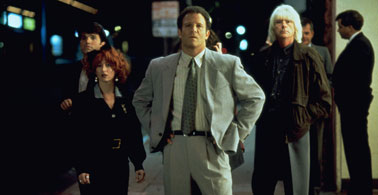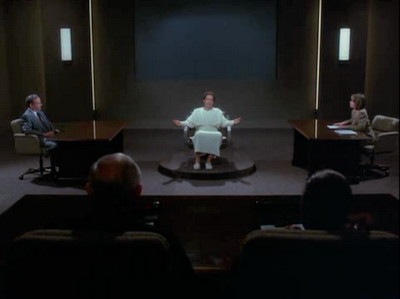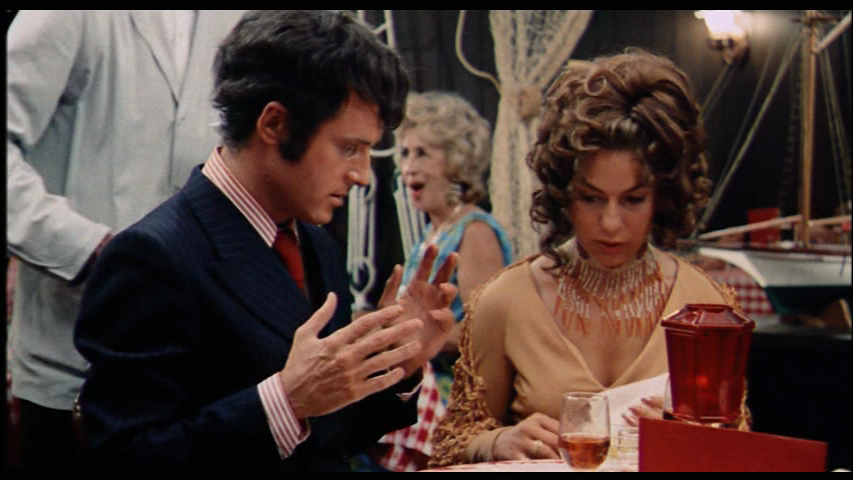The following was commissioned in 1999 by Written By, the magazine of the Writers Guild, which decided not to run it because Brooks’s agent refused to let me see The Muse in advance for this article unless a “cover story” was promised. Written By, to its credit, refuses to make deals of this kind. So the magazine paid me for the article and didn’t run it, which I hope made Brooks’s agent properly proud of his efforts. — J.R.

You may recall him as the wealthy convict in Out of Sight, or, prior to that, as Cybill Shepherd’s wisecracking cohort at the campaign headquarters in Taxi Driver, as Holly Hunter’s best friend in Broadcast News, or as the neurotic Hollywood producer in I’ll Do Anything. Maybe, if you’re luckier, you’ve seen his five underrated and highly durable comedies — Real Life (1979), Modern Romance (1981), Lost in America (1985), Defending Your Life (1991), and Mother (1996) — which will be succeeded later this year by The Muse.

Albert Brooks has so far taken solo writing credit only on Defending Your Life — sharing script credit with TV comedy writer Monica Johnson on the other four (as well as on The Scout, a disappointing 1994 baseball movie he didn’t direct), and also with Harry Shearer on Real Life, the first and probably the funniest of the lot. Read more
This was written for the Writers Guild magazine Written By; it ran in their August 1997 issue and was later reprinted in my collection Essential Cinema.
My comparison of May with Erich von Stroheim, which may sound frivolous, is actually something I take very seriously. Both filmmakers are mainstream figures with the temperaments of avant-garde artists; Orson Welles’ description of Stroheim’s style as “Jewish baroque” also fits May’s quite well; and perhaps most significantly of all, both of these highly obsessional writer-director-performers create films populated almost exclusively by monsters, yet characters whom their creators clearly love. In this latter respect, May might even be considered more radical than Stroheim because one can’t cite a single villain in her four features — unlike, say, Schani the butcher (Matthew Betz) in Stroheim’s The Wedding March. Furthermore, for me, the two greatest Stroheim films, Foolish Wives and Greed, are echoed in many respects by The Heartbreak Kid and Mikey and Nicky, the two best films of May.
On the evening of June 27, 2010, in Bologna, Italy, I had the rare, unexpected, and delightful privilege of spending a couple of hours with May. It was a friendly conversation over dinner rather than any sort of interview, but she did tell me in passing a few things about her life and work that I’ve added to this piece as footnotes. Read more
From the Chicago Reader (October 4, 2007). — J.R.

I’d like to think Elaine May had it written into her contract that the Farrelly brothers could remake her most brilliant comedy (1972) only if they left her name out of the press materials. She’s lucky to go uncredited (Neil Simon, who wrote the original script, is less fortunate), because you can’t do character-driven comedy without characters, and this one has only grotesques who change traits from moment to moment. Given the joyless vulgarity and absence of laughs, the frenzied changes in locales and character types hardly matter. A guy who sells sporting goods (Ben Stiller) gets married, drives south with his bride (Malin Akerman) on their honeymoon, and promptly falls in love with another woman (Michelle Monaghan) while discovering he hates his wife, but the ethnic humor that gave May’s movie its charge is replaced by crass mean-spiritedness. If I were in movie hell, I’d rather see Good Luck Chuck again than return to this atrocity. R, 115 min. (JR)

Read more




